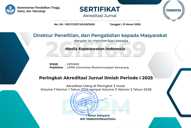A scoping Review on the Impact of Self-Stigma in Individual with Type 2 Diabetes
(1) Universitas Jenderal Soedirman
(2) Universitas Jenderal Soedirman
(3) Universitas Muhammadiyah Sukabumi
(*) Corresponding Author
Abstract
Self-stigma, also known as internalized stigma, is the psychological burden that arises when individuals adopt society’s negative perceptions about their health condition. This phenomenon is commonly experienced by individuals with type 2 diabetes mellitus (T2DM) and can significantly affect their psychological well-being and self-care practices. This scoping review aims to map the various impacts of self-stigma on individuals with T2DM based on the most recent empirical evidence. The review followed the Arksey and O’Malley framework and adhered to PRISMA-ScR guidelines. A comprehensive search was conducted across nine databases, resulting in the inclusion of twelve primary studies. The data were analyzed thematically and narratively. Self-stigma was found to have multidimensional effects, encompassing psychological aspects, behavioral aspects, clinical consequences and quality of life. Contextual factors such as age, duration of diabetes, gender, and BMI influenced the degree of self-stigma experienced. Self-stigma poses a substantial barrier to effective T2DM management. Psychosocial interventions that promote self-efficacy and social support are essential to mitigate its negative effects and enhance patients’ overall health outcomes
Keywords
Full Text:
PDFReferences
IDF Diabetes Atlas. 2025.
Corrigan PW, Watson AC. The Paradox of Self-Stigma and Mental Illness 2002:35–53.
Sari Y. Gambaran Stigma Diri Klien Tuberkulosis Paru ( Tb Paru ) Yang Menjalani Pengobatan Di Puskesmas Malingping Self Stigma Of Pulmonary Tuberculosis Among Patients Seeking 2018;7:43–50.
Kato Asuka, Fujimaki Yuko, Fujimori Shin, Izumida Yoshihiko, Suzuki R, yo Ueki Kohjiro, Kadowaki Takashi HHideki. A qualitative study on the impact of internalized stigma on type 2 diabetes self-management. Patient Education and Counseling 2016;99:1233–9. https://doi.org/10.1016/j.pec.2016.02.002.
Seo K, Song Y. Development and validation of the self-stigma scale in people with diabetes 2021:1089–97. https://doi.org/10.1002/nop2.719.
Li S, Li Y, Zhang L, Bi Y, Zou Y, Liu L, et al. Impact of fear of hypoglycaemia on self management in patients with type 2 diabetes mellitus : structural equation modelling. Acta Diabetologica 2022;59:641–50. https://doi.org/10.1007/s00592-021-01839-y.
Eitel KB, Roberts AJ, Jr RDA, Barrett CE, Bell RA, Bellatorre A, et al. Diabetes Stigma and Clinical Outcomes in Adolescents and Young Adults : The SEARCH for Diabetes in Youth Study Diabetes Stigma and Clinical Outcomes in Adolescents and Young Adults : The SEARCH for Diabetes in Youth Study. Diabetes Care 2023;46:811–8. https://doi.org/https://doi.org/10.2337/dc22-1749.
Levac D, Colquhoun H, Brien KKO. Scoping studies : advancing the methodology 2010:1–9.
Tricco AC, Lillie E, Zarin W, O’Brien KK, Colquhoun H, Levac D, et al. PRISMA Extension for Scoping Reviews (PRISMA-ScR): Checklist and Explanation. Annals of Internal Medicine 2018;169:467–73. https://doi.org/10.7326/M18-0850.
Kato A, Fujimaki Y, Fujimori S, Isogawa A, Onishi Y, Suzuki R, et al. How self-stigma affects patient activation in persons with type 2 diabetes: a cross-sectional study. BMJ Open 2020;10:1–7. https://doi.org/10.1136/bmjopen-2019-034757.
Himmelstein, M S; Puhl RM. At multiple fronts : Diabetes stigma and weight stigma in adults with type 2 diabetes. Diabetic Medicine 2020;e14387.:1–10. https://doi.org/10.1111/dme.14387.
Wang R, Lin C, Chen S, Hsu H. The Impact of Self-Stigma , Role Strain , and Diabetes Distress on Quality of Life and Glycemic Control in Women With Diabetes : A 6-Month Prospective Study 2021;23:619–28. https://doi.org/10.1177/10998004211009606.
Surucu, Hamdiye Arda; Arslan, Hatice Okur; Cetik S. as predictors of a negative perception of insulin among adults with type 2 diabetes : a hospital- based study in Turkey. Journal of Health Research 2021;35:515–26. https://doi.org/10.1108/JHR-12-2019-0298.
Kawoun S. The Effects of Self-efficacy and Self-stigma on Self-care in People with Diabetes. Journal Korean Acad Community Health Nursing 2021;32:86–94. https://doi.org/https://doi.org/10.12799/jkachn.2021.32.1.86.
Xing, Shuping; Liu, Yeling; Zhang, Hua; Li, Bin; Jiang X, Li B. The mediating role of diabetes stigma and self-efficacy in relieving diabetes distress among patients with type 2 diabetes mellitus : a multicenter cross-sectional study. Frontiers in Psychology 2023;14:1–8. https://doi.org/10.3389/fpsyg.2023.1147101.
Puhl RM, Himmelstein MS, Speight J. Weight Stigma and Diabetes Stigma : Implications for Weight-Related Health Behaviors in Adults With Type 2 Diabetes. Clinical Diabetes 2021;40:1–11.
Kato A, Fujimaki Y, Fujimori S, Isogawa A, Onishi Y, Suzuki R, et al. Associations between diabetes duration stigma development in Japanese people with type 2 diabetes : a secondary analysis of cross- sectional data. BMJ Open 2021;11:1–7. https://doi.org/10.1136/bmjopen-2021-055013.
Kawoun S. The Mediating Effect of Experiential Avoidance on the Relationship between Diabetes Distress and Self-Stigma in People with Diabetes Mellitus Type 2 in Republic of Korea. Healthcare 2023;11:1–10. https://doi.org/https://doi.org/10.3390/ healthcare11202773.
Eitel KB, Roberts AJ, Jr RDA, Barrett CE, Bell RA, Bellatorre A, et al. Diabetes Stigma and Psychosocial Outcomes in Adolescents and Young Adults : The SEARCH for Diabetes in Youth Study the SEARCH for Diabetes in Youth Study Diabetes Stigma and Psychosocial Outcomes in Adolescents and Young Adults : The SEARCH for Diabetes i. Diabetes Care 2024;47:1–6. https://doi.org/https://doi.org/10.2337/dc23-1453.
Link BG, Phelan JC. Conceptualizing Stigma. Annual Review of Sociology 2001;27:363–85.
Article Metrics
Abstract view : 187 timesPDF - 1 times
DOI: https://doi.org/10.26714/mki.8.3.2025.238-249
Refbacks
- There are currently no refbacks.
Copyright (c) 2025 Atyanti Isworo, Wahyu Ekowati, Irawan Danismaya

This work is licensed under a Creative Commons Attribution 4.0 International License.
This journal is indexed by:
Kedungmundu Raya No. 18 Semarang NRC Building Universitas Muhammadiyah Semarang
Phone: 02476740287
Fax: 02476740287
Email: mki@unimus.ac.id





















